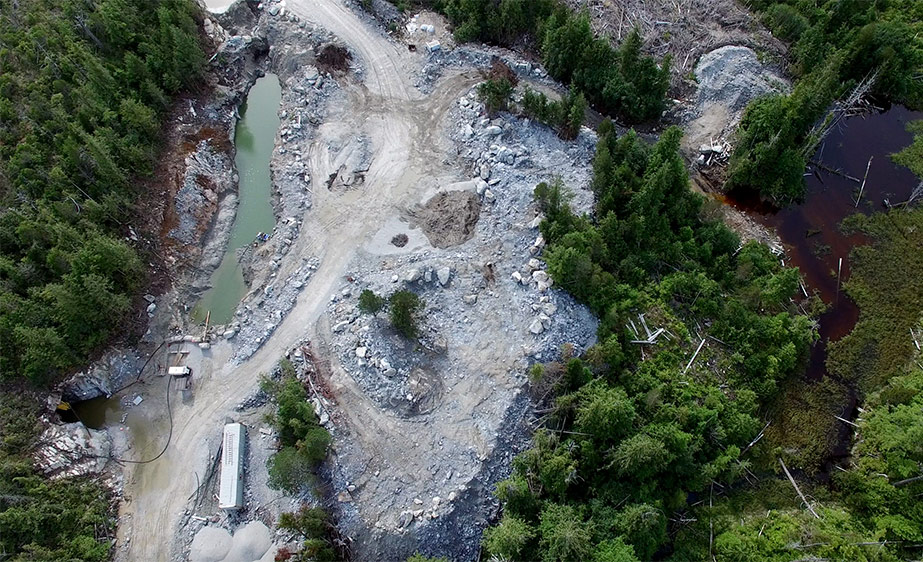B.C.’s mining laws don’t match up with the Declaration on the Rights of Indigenous Peoples Act in B.C., according to the First Nations Energy and Mining Council and the Elders they have on board.
To address the gap — until the province revamps its laws — the council has been pushing Indigenous nations to take back sovereignty through their own laws and traditions.
Their most recent report, “Indigenous Sovereignty: Implementing Consent for Mining on Indigenous Lands,” offers 25 recommendations for how Indigenous nations can do this.
“At the time of its passing, we welcomed the Declaration of the Rights of Indigenous Peoples Act and praised the provincial government for its bold leadership,” said Grand Chief Stewart Phillip, president of the Union of BC Indian Chiefs.
“We thought the recognition of the sovereignty and self-determination of Indigenous nations was finally being actioned and that First Nations’ consent would be the basis of all prospecting and mining on our lands, and we could ensure the protection of our lands and water,” he added. “But, more than two years on, no action has been taken to align provincial laws.”
The First Nations Energy and Mining Council is a non-profit organization with a mandate from the First Nations Leadership Council of BC — which includes the Union of BC Indian Chiefs, the BC Assembly of First Nations and the First Nations Summit — to help facilitate responsible energy and mining resource development that respects Indigenous nations in the province.
Allen Edzerza, an Elder who was the project lead for the report, started working in mining in the 1970s in the Yukon territory and has more recently been involved in mining reform. His roles over the years have included being appointed chief negotiator for the Yukon government, as a special advisor on Aboriginal issues for the Office of the Premier in British Columbia, and serving as a senior negotiator for the Government of Canada.
He’s recently been given the hard task by his own nation, the Tahltan Central Government, of being responsible for all negotiations relating to salmon — which inevitably involves mining activity because it so often disrupts waterways and potentially pollutes them.
“The report was intended to say to First Nations, we have never surrendered or ceded or released our title and rights,” said Edzerza. “We are sovereign nations, and the idea of free, prior and informed consent is merely a tool for us to exercise our jurisdiction and authority as a sovereign nation.”
Seeking out free, prior and informed consent — the key gap between B.C.’s mining laws and what DRIPA requires — can ultimately mean a better deal for the mining companies, too, Edzerza said. That way they don’t risk investing in mining activities that then become the subject of costly legal challenges from the First Nation whose territory they’re trying to operate in.
Two mining laws in B.C. are at fault, according to Edzerza and the report: the Mineral Tenure Act and the Mines Act.
According to the report, these laws are part of the “free entry system” and have been in place for over 150 years in various forms.
They come out of the early colonial era and still work that way, Edzerza said.
They make it much too easy for someone to just go online, fill out a free miner certificate application, pick an area off a map, pay by credit card, and never even talk to the affected First Nation. The miner then has mineral rights in that area, which starts the process of being able to stake a claim and mine, according to the report.
“Claim staking assumes terra nullius — that the land belonged to no one before colonizers arrived,” the report says. “This legal framework is outdated, colonial and not aligned with Indigenous human rights.”
Even private landowners don’t need to give permission for their land to be staked and mined, as one Kamloops couple found out in 2019.
Neither the Mineral Tenure Act nor the Mines Act acknowledge the protections given to Indigenous Peoples and their territories in federal law — Section 35 of the Constitution Act — or B.C.’s DRIPA.
A spokesperson for the Ministry of Energy, Mines and Low Carbon Innovation responded to Tyee questions by email, saying that the ministry recognized the need to modernize the mineral tenure system, including the Mineral Tenure Act, and had held initial discussions in 2018-19 with First Nations, First Nations leadership organizations and mining industry associations to discuss the matter.
“The newly released Declaration Act Action Plan will guide the modernization of the Mineral Tenure Act in consultation and co-operation with First Nations and First Nations organizations,” the statement said.
“Any steps to modernize the MTA will be undertaken with Nations and First Nations leadership organizations and industry as well as engagement with other stakeholders and the public.”
The ministry statement also said that it plans to support other possible approaches to “help mitigate” concerns around the mineral tenure system, including “better integration of mining interests into land use planning activities across the province.”
A number of experts were involved in the drafting of the “Indigenous Sovereignty: Implementing Consent for Mining on Indigenous Lands” report, including Sheryl Lightfoot, Canada Research Chair in Global Indigenous Rights and Politics and political science member on the UN Expert Mechanism on the Rights of Indigenous Peoples. Consultations took place with First Nations Chiefs across B.C.
The 25 recommendations in the report are broken down into the five stages of mining.
Under Stage 1, the claim-staking section, the report urges First Nations to exercise statutory powers under the Mineral Tenure Act, including potentially establishing their own equivalent to the province’s Chief Gold Commissioner (the authority that grants free miner certificates, cancels claims and addresses conflicts related to claims), or developing and administering their own claim staking processes.
For the second stage, defined as planning and environmental assessment, the report encourages nations to either develop and conduct their own environmental impact assessments based on their governance systems or ensure sure regional land use planning includes Indigenous nations and communities as title holders, regardless of whether title has been proven or recognized in treaty.
Under the third stage, leasing and permitting, nations are encouraged to require an Indigenous socio-cultural assessment of lease terms — in other words, rethinking mining so that it is consistent with Indigenous cultures and worldviews, and prioritizing Indigenous employment and community benefit.
For the fourth stage, defined as compliance and enforcement, the report encourages nations to develop their own standards and requirements for safe and environmentally responsible mine operation, or to designate their own chief inspector of mines and chief permitting officer.
For the fifth and final stage, mine closure and reclamation, the report suggests that nations ensure consent for reclamation plans happens prior to mine development activity occurring, or not allowing mines to operate on their territories without transparent and full financial assurance to cover the costs of reclamation and perpetual treatment.
The First Nations Energy and Mining Council has been pressing the provincial government for the past four or five years to change mining laws, Edzerza said. He helped pave the way for a major precedent-setting court win by a First Nation in the Yukon, but the outcome hasn’t yet trickled down to B.C.
“The free entry system in the Yukon was taken to court by the Ross River Dena Council and the Appeal Court declared it was unconstitutional to register a mineral claim without consulting the affected First Nation as it was granting a legal interest in land and resources,” he said.
Edzerza also points to the Gitxaała Nation case before the courts now as a key example of what can happen when consent is not obtained — and how a nation can practise their traditional laws and governance systems to prove the need for consent does exist.
The Gitxaała Nation filed a petition in the B.C. Supreme Court in October 2021. They’re challenging the province’s free entry system, and seven mineral claims made on their traditional territory on Banks Island between 2018 and 2020.
“Gitxaała’s system of governance and ayaawx (Gitxaała law) has enabled us to care for healthy territories for thousands of years. Yet, under the Mineral Tenure Act, the B.C. government gives away rights to our lands through an automatic online system, as if Gitxaała does not exist at all,” Gitxaala Elected Chief Coun. Linda Innes told The Tyee.
“This is contrary to the ayaawx, and Gitxaała knows from painful experience that it is harmful to our territories,” Innes said.
“The FNEMC report on Indigenous consent and mining is a timely resource for Indigenous nations working to uphold our own laws and push back against the legalized theft under B.C.’s mineral tenure regime.”
There is more than one system of law at work, and Indigenous law predates colonial laws, Edzerza added.
Concerns about the environment are front and centre for Indigenous communities when it comes to mining, Edzerza said. Traditional law, he said, often focuses on the relationship between the people and the land.
“In our language we say that we are interconnected,” he said. “You can’t separate us from our lands. We are part of the environment there. It’s based on the belief that all things have a spirit and are interconnected.”
“It’s a sacred responsibility that’s been handed down to our people to protect those lands and waters for all living things.” ![]()
Read more: Indigenous, Rights + Justice, BC Politics, Environment
















Tyee Commenting Guidelines
Comments that violate guidelines risk being deleted, and violations may result in a temporary or permanent user ban. Maintain the spirit of good conversation to stay in the discussion.
*Please note The Tyee is not a forum for spreading misinformation about COVID-19, denying its existence or minimizing its risk to public health.
Do:
Do not: